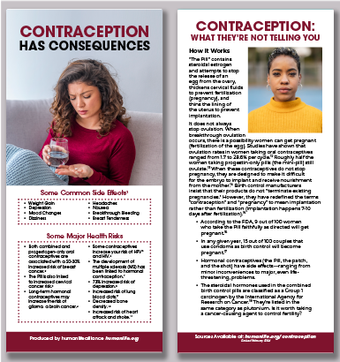Contraception Has Consequences
Chemical Contraception is often times seen as a solution for sexually active women wishing to avoid pregnancy. This fact card explores the consequences of this form of contraception and makes the case for why it should be avoided.
Sources:
- Stark, Grace Emily. “10 of the Most Common Birth Control Side Effects.” Natural Womanhood, 22 December 2018. https://naturalwomanhood.org/10-most-common-birth-control-side-effects-2018/. Accessed 28 August 2025.
- Multiple Sources:
- Kahlenborn, Chris, M.D., et al. “Oral contraceptive use as a risk factor for premenopausal breast cancer: A meta-analysis.” Mayo Clinic Proceedings, vol. 81, no. 10, October 2006, pp. 1290-1302. https://doi.org/10.4065/81.10.1290.
- World Health Organization: International Agency for Research on Cancer. “Combined estrogen-progestogen contraceptives and combined estrogen-progestogen menopausal therapy.” IARC Monographs on the Evaluation of Carcinogenic Risks to Humans, vol. 91, 2007. Available at: https://publications.iarc.who.int/109. Accessed 28 August 2025.
- Dolle, Jessica M., et al. “Risk factors for triple negative breast cancer in women under the age of 45.” Cancer Epidemiology, Biomarkers, and Prevention, vol. 18, no. 4, 8 April 2009, pp. 1157-1165. https://doi.org/10.1158/1055-9965.EPI-08-1005.
- Moreno, Victor, et al. “Effect of oral contraceptives on risk of cervical cancer in women with human papillomavirus infection: the IARC multicentric case-control study.” The Lancet, vol. 359, no. 9312, 30 March 2002, pp. 1085-1092. https://doi.org/10.1016/s0140-6736(02)08150-3.
- Hellwig, Kerstin, et al. “Oral Contraceptives and Multiple Sclerosis/Clinically Isolated Syndrome Susceptibility.” PLOS One, vol. 11, no. 3, 7 March 2016. https://doi.org/10.1371/journal.pone.0149094.
- Franceschi S, et al. “Genital warts and cervical neoplasia: an epidemiological study.” British Journal of Cancer, vol. 48, no. 5, 1 November 1983, pp. 621–628.
- Harper, Kristin N. “Two recent studies find Depo-Provera use increases HIV risk.” AIDS, vol. 29, no. 9, 1 June 2015, p. N1. https://journals.lww.com/aidsonline/fulltext/2015/06010/two_recent_studies_find_depo_provera_use_increases.1.aspx
- Soroush, Ali, et al. “The Role of Oral Contraceptive Pills on Increased Risk of Breast Cancer in Iranian Populations: A Meta-analysis.” Journal of Cancer Prevention, Korean Society of Cancer Prevention, vol. 21, no. 4, 30 December 2016, pp. 294-301. www.jcpjournal.org/journal/view.html?volume=21&number=4&spage=294.
- Johansson, Therese, et al. "Population-based cohort study of oral contraceptive use and risk of depression." Epidemiology and Psychiatric Sciences, vol. 32, no. 39,12 June 2023. https://doi.org/10.1017/s2045796023000525.
- van Hylckama Vlieg, A., et al. “Venous thrombotic risk of oral contraceptives, effects of oestrogen dose and progestogen type: results of the MEGA case-control study.” The British Medical Journal, vol. 339, 13 August 2009. https://doi.org/10.1136/bmj.b2921.
- “Oral contraceptive use and bone density in adolescent and young adult women.” Contraception, vol. 81, no. 1, January 2010, pp. 35-40. https://doi.org/10.1016/j.contraception.2009.07.001.
- Roach, Rachel E.J., et al. “Combined oral contraceptives: the risk of myocardial infarction and ischemic stroke.” Cochrane Database of Systematic Reviews, no. 8, 27 August 2015. www.cochranelibrary.com/cdsr/doi/10.1002/14651858.CD011054.pub2/abstract.
- Larimore, Walter L., M.D., and Joseph B. Stanford, M.D. “Postfertilization Effects of Oral Contraceptives and Their Relationship to Informed Consent.” Archives of Family Medicine, vol. 9, no. 2, February 2000, pp. 126-33. https://triggered.edina.clockss.org/ServeContent?issn=1063-3987&volume=9&issue=2&spage=126.
- Ibid.
- “Birth Control Pills.” Cleveland Clinic, reviewed on 5 July 2023. https://my.clevelandclinic.org/health/treatments/3977-birth-control-the-pill. Accessed 28 August 2025.
- Hill, Mark A. “Implantation.” University of New South Wales (UNSW) Embryology, https://embryology.med.unsw.edu.au/embryology/index.php/Implantation. Accessed 28 August 2025.
- “Minipill (progestin-only birth control pill).” Mayo Clinic, 13 January 2023. https://www.mayoclinic.org/tests-procedures/minipill/about/pac-20388306. Accessed 28 August 2025.
- Steiner, M.J. “How well do male latex condoms work? Pregnancy outcome during one menstrual cycle of use.” Contraception, vol. 62, no. 6, December 2000, pp. 315-319. https://doi.org/10.1016/S0010-7824(00)00185-2.
- “Agents Classified by the IARC Monographs, Volumes 1–139.” World Health Organization, updated 27 June 2025. https://monographs.iarc.who.int/list-of-classifications. Accessed 28 August 2025.



